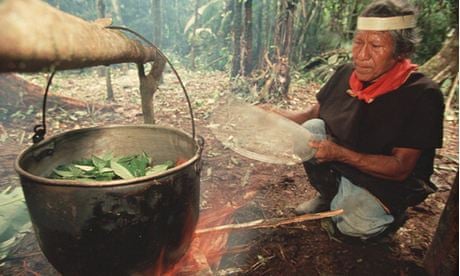Last week, the British teenager Henry Miller died after taking part in a shamanic ceremony in Colombia that included sipping the plant-based infusion known as yagé or ayahuasca. The Colombian TV channel Caracol has shown a video in which the student gives his name, half his face aglow in the firelight, and says he is taking it for the second time in two days because the first time, he felt nothing.
Just a few days before the death of Miller, the infusion was being namechecked in footage of a very different kind, when Lindsay Lohan mentioned it during the finale to her TV show, Lindsay. She said it helped her cope with a miscarriage and the "wreckage of her past life".
Such accounts of the benefits of drinking ayahuasca are common. Taking it was listed on the "Things to do" section of the website of the hostel where Miller was staying, Casa del Rio (it has since been removed). Even National Geographic magazine has reported on its power to cure depression, for one correspondent at least; the vomiting ayahuasca induces is thought to be purgative. Musicians from Sting and Paul Simon to indie artists Klaxons and the Bees have all spoken about their usage. In August 2010, Paul Butler of the Bees told the Guardian, "Ayahuasca is most definitely not a drug, it's plant medicine." Is that right?

"Ayahuasca is a way of making available DMT, a very powerful stimulator of seretonin receptors in the brain," says David Nutt, founder of Drug Science, and the former chair of the advisory council on the misuse of drugs. "Basically, DMT doesn't normally get into the body because it's broken down by the stomach. But what native Americans learned hundreds of years ago was that if you make a drink with the plant product that contains DMT, and mix it with a bark product, the bark product acts as a blocking agent and the DMT can get into the body."
Nutt points out that there are churches in Brazil such as Santo Daime and União do Vegetal that consider ayahuasca a sacrament. "One of them gives it to children on a regular basis. It doesn't seem that ayahuasca is harmful, but it probably depends how it is made, and how much is taken."
The legal position is complicated. In 2011, Peter Aziz became the first British man to go to prison for administering ayahuasca, on a retreat in Weston-super-Mare. DMT is a class-A drug in the UK. But, says Niamh Eastwood, executive director of Release, a charity that advises on drugs law, it is hard to prove that ayahuasca is "a controlled substance of and in itself". She says that in the case of Aziz, "a court of appeal decision held that the making of an infusion out of substances containing DMT was an offence under the Misuse of Drugs Act 1971 as it amounted to producing a controlled drug by making a preparation".
But in November 2012, the Crown Prosecution Service dropped a case against a leader of Santo Daime, after the church, which has become increasingly popular in the west, had imported a large quantity of ayahuasca to the UK. Richard Parry, of BSB Solicitors, acted for the defence.
"Do you want the short answer?" he says. "It's illegal. The Home Office maintains the position that it's illegal. They dropped the case without saying why." His client's defence made use of article nine of the European convention of human rights, which protects usage on religious grounds. "That point has never been litigated," he says. "We also raised the fact that customs had imposed duty on the ayahuasca."
Either way, ayahuasca will be in the news again: Parry says the church of União do Vegetal has applied to the Home Office for a licence to import.

Comments (…)
Sign in or create your Guardian account to join the discussion